Thesaurus : Doctrine

► Full Reference: Marty, F., The Case for Compliance Programs in International Competitiveness: A Competition Law and Economics Perspective, in Frison-Roche, M.-A. (ed.),Compliance Monumental Goals, series "Compliance & Regulation", Journal of Regulation & Compliance (JoRC) and Bruylant, to be published.
____
► Article Summaryésumé de l'article (done by the Journal of Regulation & Compliance): The author analyzes economically the question of whether the compliance programs set up to respect competition rules are for the sole purpose of avoiding sanctions or also contribute to the goal of increasing the international economic performance of companies. which submit to them.
The author explains that companies integrate by duplication external standards to minimize the risk of sanctions, developing a "culture of compliance", which produces their competitiveness increase and the effectiveness of the legal and economic system. In addition, it reduces the cost of investment, which increases the attractiveness of the company.
In this, this presentation based on the postulate of the rationality of companies and investors, compliance programs can fall under self-regulation. The duplication of the law that they operate takes place largely according to "procedural" type methods.
____
📝 go to the general presentation of the book 📘Compliance Monumental Goals, in which this article is published
________
Jan. 17, 2024
Thesaurus : Doctrine

► Référence complète : O. Catherine, "La spécificité des enquêtes internes pratiquées par les groupes internationaux", in M.-A. Frison-Roche et M. Boissavy (dir.), Compliance et droits de la défense. Enquête interne – CJIP – CRPC, Journal of Regulation & Compliance (JoRC) et Dalloz, coll. "Régulations & Compliance" à paraître.
____
📕consulter une présentation générale de l'ouvrage, Compliance et droits de la défense. Enquête interne – CIIP – CRPC, dans lequel cet article est publié
____
► Résumé de l'article (fait par le Journal of Regulation & Compliance - JoRC) : l'article a pour objet de décrire comment se déroule une enquête interne lorsqu'elle est diligentée dans une entreprise de dimension internationale. Les juristes d'entreprise sont particulièrement rompus à le faire, ayant suivi les évolutions des grandes entreprises, mutations qui impliquent la dynamique d'enquêtes internes globales.
Pour y procéder, le juriste d'entreprise doit non seulement se muer en "enquêteur" mais encore établir préalablement un programme de conformité légitime et robuste, global et intégrant les particularités locales. Ce référentiel ainsi constitué dans un corpus communs de normes vise notamment le système d'alertes et la conduites des enquêtes internes. Ce dispositif, transparent, doit produire de la confiance dans l'ensemble du groupe.
Les enquêtes sont souvent internationales ou se déroulent souvent à l'étranger, le particularisme français tenant à la fragilité du secret des correspondance avec l'avocat et l'absence de confidentialité des avis juridiques pouvant mettre en difficulté l'entreprise dans la bonne menée du dispositif, alors même que les règles d'imputabilité de la responsabilité pénale s'assouplissent à l'égard des groupes.
L'auteur décrit ensuite la conduite opérationnelle des enquêtes internes menées par un groupe international.
____
🦉Cet article est accessible en texte intégral pour les personnes inscrites aux enseignements de la Professeure Marie-Anne Frison-Roche
________
Sept. 15, 2023
Publications
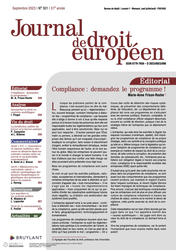
🌐follow Marie-Anne Frison-Roche on LinkedIn
🌐subscribe to the Newsletter MAFR Regulation, Compliance, Law
____
► Full Reference: M.-A. Frison-Roche, "Compliance : demandez le programme !" ("Compliance: ask for the programme!), J.D.E., 2023/7, No. 301, p. 349.
____
📝read the article (in French)
____
🌐see the LinkedIn post presenting this article
____
► Summary of the article: Compliance programmes are neither constraints imposed by a 'mad regulator' forcing companies to show in advance that they comply with all the regulations applicable to them, nor are they a delegation by the State of tasks it is incapable of accomplishing, such as eradicating corruption or stopping global warming.
On the contrary, they are a tool in the service of the alliance between public authorities and companies in the pursuit of the Monumental Goals of Compliance Law. Through them, the company implements actions to prevent the systemic risks associated with its activity. It thus assists the authorities in regulating new areas (digital, space) while adopting a sustainable strategy. As a result, it does not suffer from regulations, but participates in shaping the future. In this future, the judge plays a central role in shaping the compliance programmes that will be raised or challenged in 'systemic cases'.
________
Updated: June 16, 2023 (Initial publication: Nov. 24, 2022)
Conferences

♾️ suivre Marie-Anne Frison-Roche sur LinkedIn
♾️ s'abonner à la Newsletter MAFR Regulation, Compliance, Law
____
 ► Référence complète : Frison-Roche, M.A., Les programmes de compliance, in Université de Lille, Les risques concurrentiels des entreprises à l’aune de la transition écologique et numérique : regards croisés sur les outils de prévention, Lille, 16 juin 2023. ____
► Référence complète : Frison-Roche, M.A., Les programmes de compliance, in Université de Lille, Les risques concurrentiels des entreprises à l’aune de la transition écologique et numérique : regards croisés sur les outils de prévention, Lille, 16 juin 2023. ____
► Présentation générale de la conférence : sss
____
► pour aller plus loin ⤵️
Updated: Feb. 2, 2023 (Initial publication: June 23, 2021)
Thesaurus : Doctrine

► Full Reference: J.-M. Coulon, "Le droit de la compliance dans le secteur d'activité de la construction et les contradictions, impossibilités et impasses auxquelles les entreprises sont confrontées" ("Compliance Law in the construction sector and the contradictions, impossibilities and impasses facing companies"), in M.-A. Frison-Roche (ed.), La juridictionnalisation de la Compliance, coll. "Régulations & Compliance", Journal of Regulation & Compliance (JoRC) and Dalloz, 2023, p. 133-140.
____
📕read a general presentation of the book, La juridictionnalisation de la Compliance, in which this article is published
____
► The summary below describes an article following the colloquium L'entreprise instituée Juge et Procureur d'elle-même par le Droit de la Compliance (The Entreprise instituted Judge and Prosecutor of itself by Compliance Law) , co-organized by the Journal of Regulation & Compliance (JoRC) and the Faculté de Droit Lyon 3. This manifestation was designed under the scientific direction of Marie-Anne Frison-Roche and Jean-Christophe Roda and took place in Lyon on June 23, 2021. During this colloquium, the intervention was shared with Christophe Lapp, who is also a contributor in the book (see the summary of the Jean-Marc Coulon's Article).
In the book, the article will be published in Title I, devoted to: L'entreprise instituée Juge et Procureur d'elle-même par le Droit de la Compliance (The Entreprise instituted Judge and Prosecutor of itself by Compliance Law ).
____
► Summary of the article (done by the author): The construction industry is not a regulated sector. Its market is made up of a superposition of territorial strata which are all relevant markets, to which corresponds a specific microcosm of companies. Finally, the temporary association between companies for the purposes of carrying out a project or a work is consubstantial with this sector.
The penetration of Compliance in this sector is inevitably very heterogeneous and results from both exogenous factors (other partners within temporary associations, influence of economic operators from other sectors of activity, capital providers and lenders, incitations from professional organizations ) the endogenous (submission to a Financial Regulatory Authority because the company is listed ; application of the laws on duty of vigilance, and French Law called "Sapin 2"). For example, subject to all these factors combined, the Bouygues group is particularly sensitive to compliance.
Not only internal "legislator", the Bouygues group finds itself in turn "prosecutor and judge" both of itself and of others. Indeed, leading an investigation, filing a complaint, triggering an ethics alert, making use of the leniency program, this group is, however, no other than a sort of assistant for the Prosecutor. In addition, scrutinizing its stakeholders, sanctioning its employees, resorting to a Convention Judiciaire d'intérêt public (judicial agreement in the public interest) or negotiating its sanction within the framework of a procedure instituted by a multilateral bank, it fulfills the function of a judge. Legislator, prosecutor, judge, the Bouygues group is faced with a paradox, in a way encouraged to exercise “sovereignty”, yet it does not benefit from the attributes attached to it or from the unwavering support of the competent Public Authorities.
________
July 6, 2022
Publications
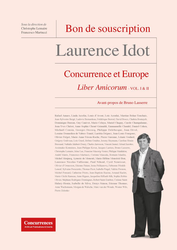
🌐follow Marie-Anne Frison-Roche sur LinkedIn
🌐subscribe to the Newsletter MAFR Regulation, Compliance, Law
____
► Full Reference: M.-A. Frison-Roche, "L'appui du Droit de la Compliance pour la maîtrise quotidienne du Droit de la concurrence" ("The support of Compliance Law for the daily mastery of Competition Law"), in C. Lemaire & F. Martucci (eds.), Liber Amicorum Laurence Idot. Concurrence et Europe, vol. I, pref. C. Lemaire & F. Martucci, foreword B. Lasserre, Concurrences, 2022, pp. 369-374
____
► English Summary of the article: Competition Law has become so huge and has included so many regulations and "regulatory" perspective that we end up giving up trying to grasp it as a whole, preferring to become a specialist in one of its parts. That would be to lose sight of the simple and strong reason that unites the whole and gives it its breath: Freedom.
Freedom experienced by the persons in their daily economic action, Freedom guarded by Competition Law, always returning to its principle: Free Competition. Therefore, the European Union places great emphasis on Competition. To make effective and to keep it in this state, “Competition Policy” is based on Competition Law, but if authorities and judges do not blame companies for their power, they do not rely on it.
To do this, Competition Law must be supported by Compliance Law, which strongly encourages companies to act for the effectiveness and the promotion of competitive principles. Competition Law is thus slipping from the Ex-Post towards the Ex-Ante, the commitments of companies leading them to cease being passive, even punished, to become convinced actors and themselves pedagogues. Something to please a great Professor of Competition Law, to whom homage is paid here.
____
📗read the Table of Contents of the book in which this article is published (in French)
____
🚧read the bilingual Working Paper which is the basis of this article, with additional developments, technical references and hyperlinks
____
📝read the article (in French)
________
July 6, 2022
Adventures of the Ogre Compliance

June 1, 2022
Compliance: at the moment

May 24, 2022
Thesaurus : Soft Law
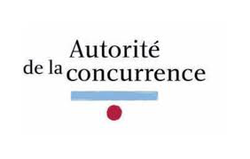
► Référence complète : Autorité de la concurrence (ADLC), Document-cadre du 24 mai 2022 sur les programmes de conformité aux règles de concurrence, 2022.
___
____

Oct. 20, 2021
Publications

 ► Référence Full R complète : Frison-Roche, M.-A., L'appui du Droit de la Compliance pour la maîtrise quotidienne du Droit de la Concurrence, document de travail, octobre 2021.
► Référence Full R complète : Frison-Roche, M.-A., L'appui du Droit de la Compliance pour la maîtrise quotidienne du Droit de la Concurrence, document de travail, octobre 2021.
_____
► This Working paper is the basis document de travail a été élaboré pour servir de base à une contribution aux Mélanges offerts à Laurence Idot.
____
► Working Paper Summary: Competition Law has become so huge and just "regulations" that one would give up trying to understand it as a whole, preferring to become a specialist in one of its parts. This would be to lose sight of the simple and strong reason which unites the whole and gives it its breath: Freedom. Freedom experienced by the person in his daily economic action, Freedom kept by Competition Law, always returning to its principle: Free Competition. This is why the European Union places a so great emphasis on Competition. To build it and keep it effective, "Competition Policy" is articulated with Competition Law, but if authorities and judges do not blame companies for their power, they do not rely on it. To do this, they must then be supported by Compliance Law, which strongly encourages companies to act for the effectiveness and the promotion of Competition principles. Competition Law thus slips from the Ex Post to the Ex Ante, with the commitments of companies leading them to stop being passive and punished in order to become convinced players and educators of the others. Something pleasant for a great professor of Competition Law, to whom tribute is paid here.
____
Lire le document de travail ci-dessous⤵
July 23, 2021
Publications

Full reference: Frison-Roche, M.-A., Programme de mise en conformité (Compliance), Dictionnaire de droit de la concurrence, Concurrences, Art. N° 12345, 2021
Read the definition (in French)
June 17, 2021
Compliance: at the moment

► Compliance Law and Competition: for building, is it necessary to legislate ? Example of quasi-public interest judicial agreement: the French Competition Authority's Statement of June 3, 2021 on Facebook
The French law so-called "Sapin 2" of 2016, organized the "convention judiciaire d’intérêt public - CJIP" (Public Interest Judicial Agreement) which allows the prosecutor to undertake not to prosecute a company in returns for this company's commitments for the future. Is this mechanism reserved for this law, which only concerns corruption and bribery? The answer is often positive.
Is it so obvious?
Since the entity having the power to prosecute therefore always has the power not to prosecute. As the company always has the freedom to make commitments for the future. And everything stops.
News in Competition Law illustrate this. On June 9, 2021, as part of a transaction, the Autorité de la concurrence (French Competition Authority) sanctions Google (➡️📝 Communiqué of the Autorité de la Concurrence , translated in English by the French Competition Authority) , which has not contested the facts, for abuse of dominant position for having privileged its services in the online advertising services. Similar facts were alleged against Facebook. But on June 3, 2021, the Autorité de la concurrence (French Competition Authority) published a "communiqué de presse" (➡️📝statement translated in English by the French Competition Authority) saying that Facebook has, during the investigation, proposed commitments regarding its future behavior. It is remarkable that this statement on Facebook is published as an “acte de régulation” (regulatory act).
Yes, it is indeed an regulatory act about the future and structuring the online advertising area, internalized in this company which engages itself in its future behavior. With its statement, the Competition Authority invites the “acteurs du secteur” (actors of this sector) to make observations, for the development of what will be a sort of compliance program.
In these negotiations which are akin to a game table, where everyone calculates without knowing if they enter into a negotiation or a confrontation, the first game assuming that one shows more cards than in the second, it is indeed towards a kind of Public Interest Judicial Agreement that they are going with a Competition Authority which is both Judge and Prosecutor, concludes the agreement and, through a later decision, gives it force. Under the various legal qualifications, it is indeed the same general mechanism of Compliance Law, well beyond the specific French law known as Sapin 2.
Managed in this way, Compliance Law being an Ex Ante corpus, transforms the Competition Authority, an Ex Post Authority, into an Ex Ante Authority, openly taking "acte de régulation" (Regulatory Act), and allows it to rely on the power of companies, thus “committed”, to structure markets, which are however not regulated. Like advertising or retailing areas (➡️📝see Frison-Roche, M.-A., From Competition Law to Compliance Law: Example of French Competition Authority's decision on central purchasing body in mass distribution, 2020).
Thus Compliance Law has achieved the autonomy of Regulatory Law with regards to the notion, which nevertheless seemed intimate to it, of "sector".
April 21, 2021
Publications
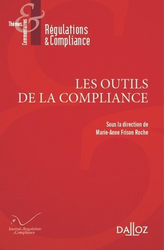
► Full Reference: M.-A. Frison-Roche, "La formation : contenu et contenant de la Compliance" ("Training: content and container of Compliance"), in M.-A. Frison-Roche (ed.), Les outils de la Compliance, coll. "Régulations & Compliance", Journal of Regulation & Compliance (JoRC) and Dalloz, 2021, pp.. 227-244.
____
📝read the article (in French)
____
🚧read the bilingual Working Paper which is the basis of this article, with additional developments, technical references and hyperlinks
____
📕read a general presentation of the book, Les outils de la Compliance, in which this article is published
____
► Summary of the article (done by the Journal of Regulation and Compliance): Firstly, as Training is a specific Compliance tool, it is supervised by Regulators. It becomes mandatory when it is contained in Compliance programs or sanction decisions. Since effectiveness and efficiency are legal requirements, what is the margin of companies to design them and how to measure the result?
Secondly, as long as each Compliance tool includes, more and more, an educational dimension, we can take each of them to identify this perspective. So even condemnations and prescriptions are so many lessons, lessons given, lessons to be followed. The question is then to know who, in this so pedagogical Compliance Law, are the "teachers"?
________

Updated: July 25, 2020 (Initial publication: July 1, 2020)
Publications

This working document served as the basis for an article, contribution in the collective book Compliance Tools, 2020
___
Summary of this working paper:
Training is a specific Compliance tool and a dimension that each Compliance tool expresses.
Firstly, as a training it is a specific Compliance Tool, it is supervised by Regulators. It even becomes compulsory when it is contained in Compliance programs. Since the effectivity and the efficiency are legal requirements, what is therefore the margin of companies to design it and how can we measure its result?
Secondly, as each Compliance Tool contains, more and more, an educational dimension, we can take back each of them to detect this perspective. Thus, even sanctions and prescriptions, are lessons: lessons given, lessons to follow. The question is then to know who, in this so pedagogic Compliance Law, are the "instructors"?
___________________________________________________________________
Introduction:
Training is akin to these things - and very precious - that we do, or even dream of doing, but so poorly expressed from the moment we take them as an object of technical writing. Just do it.
It would be however unfortunate to publish a book on Compliance Tools without giving a particular place to training, the piece would miss in the puzzle.
So much money spent by companies, by fair or foul means, especially when Compliance programs imposed as sanctions contain heavy training obligations leading people to retain word for word everything that is forbidden to them, in order to always abstain from now on. Training is thus the sharp point of such Hard Law appearing under the steel of Criminal Law's sword in amphitheaters and e-learnings.
But also so much speeches about the necessity of a "Compliance culture" which should be instilled to firms, Compliance spousing with joy in an harmony with their "raison d'être" and the historical identity of this group of people which is the company itself through trainings which tell Compliance as a link, an outstretched hand toward those with whom managers want to renew a moral contract in an ethic for which they give the good example. It is not Prohibition anymore but Communication and Community that set the tone of a human dialogue with employees, stakeholders, administration and judges.
It is possible to assume that the former does not exclude the latter, that Training should target all of this, the learning of mandatory prescriptions to follow without discussion but also the adhesion to guidelines, and this because everyone has understood that they are funded.
Everything and its contrary, then. "Learning by heart" takes here its full sense: get everyone to remember mechanically in order for no one to misstep (with always more machines which massively teach us the regulatory corpus on our mobile screens) but also succeed in bringing our "heart" in Compliance, thanks to specific training methods (with always smaller groups, with always less public discussions in pleasant places). Everything and its contrary, then.
It would be imperative but also sufficient to cumulate. Doing everything. Those who propose training softwares as those who organize conferences, meetings and travels and are favorable to this addition of face-to-face and distancing methods, of mechanic and of human relations. Concretely, at the end companies observe that since the first does not replace the second, costs add up. But, in Compliance, costs constitute a grave default of it, training taking a large part of this default. Managers end up finding the addition too heavy, especially if they thought that training of people is one of the public school's mission and not one of private companies' purpose!footnote-1837.
Moreover, training to Compliance is not outside Compliance Law, which makes it specific!footnote-1838. Indeed, Compliance Law, corpus of Ex Ante mechanisms, targets to concretize "monumental goals"!footnote-1836. Set by public authorities, these monumental goals are internalized in companies in order for them to implement expected means in order for them to be reached in the future. These monumental goals can be negative (that corruption, money laundering, human rights violations, financial system crisis, etc. shall not occur), or positive (that ecological equilibrium shall be restored, that education shall be supplied, that healthcare shall be provided, etc.).
Compliance Law takes as criteria of effectivity for implemented mechanisms, their reality, but also their efficiency, that is their ability to make sure their goal is achieved.Training must achieve its goal. Thus, in Compliance, the purpose is not only the one of every training, that is transmitting a knowledge in order to making the student more learned!footnote-1839, but it is to contribute to the "monumental goal" of Compliance Law itself, which is a practical goal and not a scholar goal. For example, training about the applicable rules concerning corruption should have an effect to reduce corruption. And because corruption is itself a part of Compliance Law, in the same way the Regulation Authority can force to educate oneself or train others, the Supervision Authority should control not only the reality but also the effectivity and the efficiency of trainings.
However, the effectivity and the efficiency of Compliance training, because they are full part of Compliance Law, should be controlled by the Authority not only in their reality but also in their concrete ability to participate in the pursued goal. Thus, to keep the example of fight against corruption, training plays in it an essential role because the firm faces an alternative: either a mechanic solution consisting in setting literal interdictions, for example the interdiction to give up a value greater than a certain amount (according to the "anti-gift" rule) with the risk of getting around that every literal prescription offers, or a a solution by training consisting in explaining to everybody that it is wrong to corrupt but that it is acceptable to give samples. Training rather bets on spirit while the machine integrates the letter.
But this refers to the Regulation and Supervision Authority which will appreciate the company due diligences to reach the goals. One observes that, more and more, Authorities economize one step: rather than explain to the companies how educate people that work for them or with them, regulators educate directly. Is on this point remarkable the "guide" published in 2012, whose second edition of 2019 has been updated in 2020, jointly by the Department of Justice (DoJ) and the financial regulator (Securities &Exchanges Commission - SEC) to know everything about the Foreign Corruption Practices Act (FCPA). Through the explanations offered to everyone!footnote-1840 of the principles, the reminded definitions, the told cases, they are behaviors prescriptions which are formulated especially for foreign companies by the prosecutor authority and the American sanction authority, allied in this handbook which has such weight that we can consider that it is as valuable as a guideline, soft law creator of Law and rights.
In the concentration of all powers which is often reproached to the Regulator, there is also the magisterium of the teacher, the one who educates stakeholders. After having assumed, on the American model, that the regulator should be the "advocate" of the rules for companies, proving to them the interest that they have to respect them, it is logical that, in what some have called "Regulation, Act 2" this Regulator's pleading about the good news of Regulation for the firm justifying thus that this one integrates it in Ex Ante was prolonged in magistral lesson: the "regulator-institutor" explains to everybody how using rules for an always still in progress Law ("Better Regulation").
While training was before only peripheral, it is now at the heart. If it is so important, as every other "Compliance tool", it should take what we expect from it. The publications about training most often exhibit what it should be and a sorrowful spirit measures what sometimes appears as a huge gap between descriptions and realities sometimes reported.
Educating being without any doubt one of the most difficult actions, we should probably neither describe a paradise of maieutics nor write a hot paper against what already has the merit to exist, but list what we can expect from Training mechanisms when they apply to Compliance, because here, rather more than for the other tools, it is a mean obligation. Which content should have a training ? (I). Because Compliance Law targets training as one of the mean to reach "monumental goals" which constitutes the substantial heart of this branch of Law, the training dimension is not limited to stamped training, finding back this pedagogical dimension in almost all the other tools (II). In that, Training appears as the alpha and the omega of Compliance.
June 26, 2020
Thesaurus : Doctrine
► Référence complète : J.-Ch. Roda, "Compliance et antitrust. Le discours de la méthode", in J.-Ch. Roda (dir.), Compliance et droit de la concurrence : nouveaux défis, nouveaux enjeux, Revue internationale de la compliance et de l'éthique des affaires, n° 3, juin 2020, étude 109, pp. 11-15.
____
► Résumé de l'article (fait par l'auteur) : "The discourses of the competition authorities are essential for the dissemination of the compliance culture. Their comparative analysis reveals significant divergences that may explain the differences in compliance adherence." (traduction libre : "Les discours des autorités de concurrence sont essentiels pour la diffusion d'une culture de compliance. Leur analyse comparative révèle des divergences significatives, qui peuvent expliquer les différences d'adhésion à la compliance.")
____
🦉Cet article est accessible en texte intégral pour les personnes inscrites aux enseignements de la Professeure Marie-Anne Frison-Roche
________
June 26, 2020
Thesaurus : Doctrine
► Référence complète : L.-M. Augagneur, "Les aspects relatifs à la circulation des données dans les programmes de conformité en droit de la concurrence", in J.-Ch. Roda (dir.), Compliance et droit de la concurrence : nouveaux défis, nouveaux enjeux, Revue internationale de la compliance et de l'éthique des affaires, n° 3, juin 2020, étude 111, pp. 21-25.
____
► Résumé de l'article (fait par l'auteur) : "The risk assessment of antitrust practices involving datas could be uncertain in consideration of the increasing production and circulation of datas, their algorithmic use, and the intricate operation of the concerned markets. Far from being limited to a standard system or technology solutionism, relevant compliance programs should rely on the own advocacy policy of the firm. This policy can be designed by identifying competition key factors and habits implemented throughout the data’s life cycle." (traduction libre : "L'évaluation des risques liés aux pratiques antitrust impliquant des données pourrait être incertaine compte tenu de la production et de la circulation croissantes des données, de leur utilisation algorithmique et du fonctionnement complexe des marchés concernés. Loin de se limiter à un système standard ou à un solutionnisme technologique, les programmes de conformité pertinents devraient s'appuyer sur la politique de défense des intérêts de l'entreprise. Cette politique peut être conçue en identifiant les facteurs clés de la concurrence et les habitudes mises en œuvre tout au long du cycle de vie des données.")
____
🦉Cet article est accessible en texte intégral pour les personnes inscrites aux enseignements de la Professeure Marie-Anne Frison-Roche
________
June 25, 2020
Thesaurus : Soft Law
Référence complète : Department of Justice & Securities & Exchanges Commission, FCPA Ressource Guide, June 2020, 132 pages.
March 5, 2020
Conferences

Référence : Frison-Roche, M.-A., La mesure de l'effectivité et de l'efficacité des outils de la compliance (conception, présentation et modération des débats), in Les outils de la Compliance, Journal of Regulation & Compliance.
Voir les autres thèmes, autres dates et autres manifestations particulières du cycle dans son ensemble.
Cette conférence sert d'appui à la réalisation d'un ouvrage plus global portant d'une façon générale sur Les outils de la Compliance.
L'ouvrage Compliance Tools sera publié en même temps.
Présentation de la Conférence : Après avoir examiné différents outils spécifiques, comme La cartographie des risques ou Les incitations, et avant d'en aborder d'autres comme ceux relevant de la a Compliance by Design, celle-ci méritant aussi d'être examinée avec quelque distance dans sa prétention à être la solution à tout enjeu de compliance, il convient de regarder comment l'on mesure l'efficacité de tous ces outils de Compliance. En effet, puisque toutes les techniques sont des "outils", ils ne prennent sens qu'au regard d'une finalité qu'ils doivent atteindre effectivement. Cette effectivité doit être mesurée, et cela dès l'Ex Ante, l'entreprise devant en permanence donner à voir l'effectivité de la performance des outils de la Compliance.
Mais autant les normes prolifèrent, les discours se multiplient, les engagements sont pris, autant les techniques de mesure de l'effectivité de l'ensemble semblent assez faibles. Non pas que les sujets de droit astreints aux obligations de Compliance ou désireux de réaliser les buts systémiques ou de bien commun visés par la Compliance ne désirent pas en avoir, mais ces instruments de mesure semblent encore les moins construits, souvent déclaratifs ou de type discursifs, ou trop mécaniques. Dès lors, est-ce en partant du but que l'on cherche à atteindre que l'on doit mesurer l'efficacité des outils de Compliance, sans que cela transforme les tâches qui pèsent de grè ou de force sur les opérateurs en obligation de résultat ? Ou est-ce en demeurant en amont, par une seule "conformité" à ce qui leur est demandé, comme comportement et comme organisation structurelle, que les entreprises donnent à voir qu'elles ont effectivement rempli leur tâche, sans plus se soucier des effets produits sur la réalité des choses, cette réalité que ceux qui ont conçu la norme avaient en tête ?
Cette question a des implications majeure en terme de charge de preuve et de responsabilité, impliquant des organisations plaçant la confiance, coeur de la Compliance, plutôt dans des instruments technologiques connectant des data ou plutôt dans des personnes ayant le sens du bien commun. Cette question est aujourd'hui ouverte.
_____
May 29, 2019
Publications
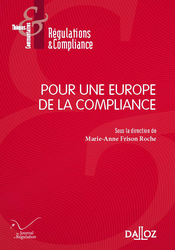
♾️ follow Marie-Anne Frison-Roche on LinkedIn
♾️ subscribe to the Newsletter MAFR Regulation, Compliance, Law
____
► Full Reference: M.-A. Frison-Roche (ed.), Pour une Europe de la Compliance (For the Europe of the Compliance), series "Régulations & Compliance", Dalloz, 2019, 124 p.
____
This volume is the continuation of the books dedicated to Compliance in this collection.
📚Read the other books' presentations of the collection about Compliance:
🕴️M.-A. Frison-Roche (ed.), 📕La juridictionnalisation de la Compliance, 2023
🕴️M.-A. Frison-Roche (ed.), 📕Les Buts Monumentaux de la Compliance, 2022
🕴️M.-A. Frison-Roche (ed.), 📕Les outils de la Compliance, 2021
🕴️N. Borga, 🕴️J.-Cl. Marin &🕴️J.-Ch. Roda (ed.), 📕Compliance : l'Entreprise, le Régulateur et le Juge, 2018
🕴️M.-A. Frison-Roche (ed.), 📕Régulation, Supervision, Compliance, 2017
🕴️M.-A. Frison-Roche (ed.),📕 Internet, espace d'interrégulation, 2016
📚Read the presentations of the other titles of the collection.
____
► General presentation of the book: This book is written in French. The topic is : "For the Europe of the Compliance".
See below its general presentation in English.
The political dimension is intrinsic to the Compliance Law. Indeed, compliance mechanisms consist of internalizing in certains companies the obligation to implement goals of general interest set by Public Authorities. These public bodies control the Ex Ante reorganization that implies for these companies and punish Ex Post the possible structural inadequacy of these compagnies, becoming transparent for this purpose.
This new mode of governance establishes a continuum between Regulation, Supervision, Compliance (book published in 2017) and renew the links between Companies, Regulators and Judges
This political dimension must be increased: the Compliance Law of Compliance must today be used to build Europe.
One can observe not only the construction of the European Compliance Law, object-by-object, sector-by-sector, purpose-by-purpose, but also the construction of the European Compliance Law that transcends and unifies them. Becoming independent of American Law and ceasing to be in reaction, even on the defensive, the Compliance Law contributes to the European project, offering it a higher ambition, that Europe can carry and, by this way, can carry the Europe itself, not only to preserve the European economy from corruption or money laundering, but by claiming the protection of nature and human beings.
This is why the book describes the "reasons and objectives" of the Europe of the Compliance, which makes it possible to describe, detect and even predict the ways and means.
____
► Understand the book through the Table of Contents and the summaries of each article:
🕴️M.-A. Frison-Roche, 📝Avant propos
🕴️K. Lenaerts, 📝Le juge de l'Union européenne dans une Europe de la compliance
🕴️M.-A. Frison-Roche, 📝Un droit substantiel de la compliance, appuyé sur la tradition européenne humaniste
I. LES RAISONS ET LES OBJECTIFS D'UNE EUROPE DE LA COMPLIANCE (THE REASONS AND OBJECTIVES OF THE EUROPE OF THE COMPLIANCE)
🕴️X. Musca, 📝Construire une Europe de la compliance en donnant une meilleure place aux entreprises
🕴️P. Vimont, 📝La place de la diplomatie dans l'avancée d'une Europe de la compliance
🕴️P. Sellal, 📝Les vertus de la compliance : une réponse possible aux faiblesses de l'Union européenne ?
🕴️J.-J. Daigre, 📝Compliance, entreprise et Europe
II. LES VOIES ET MOYENS D'UNE EUROPE DE LA COMPLIANCE (THE WAYS AND MEANS OF THE EUROPE OF THE COMPLIANCE)
🕴️J.-Cl. Marin, 📝Quels outils pour la construction du droit de la compliance en Europe ?
🕴️M. Canto-Sperber, 📝La compliance et les définitions traditionnelles de la vertu
🕴️T. Bonneau, 📝Compliance et secteur bancaire et financier en Europe
🕴️C. Duchaine, 📝L'Agence française anticorruption, à l'appui de l'Europe de la compliance
🕴️D. Martin, 📝Les contraintes et les vertus de la compliance
🕴️A. de La Cotardière, 📝Construire une Europe de la compliance lisible pour les entreprises
________
Frison-Roche, M.-A., Compliance, see
Nov. 13, 2018
Thesaurus : Doctrine
Discours d'Emmanuel Macron, président de la République, au Forum "Gouvernance Internet", Unesco, 13 novembre 2018.
Lire le Discours. Compl

Oct. 1, 2018
Publications

► Full Reference: Frison-Roche, M.-A., Competition Law & Compliance Law , Working Paper, October 2018.
____
► this Working Paper has served as basis for an Article published later in French in the Review Concurrences ; read the presentation in English of this Article.
____
► Summary and introduction : Compliance Law is a new branch of Law, still under construction. One can have a "narrow definition" of seeing it as the obligation of businesses to show that they are constantly and actively complying with the law. One can have a richer definition, of a substantive nature, defining it as the obligation or the own will of certain companies to achieve "monumental goals" that go beyond economic and financial performance.The Competition Law partly integrates its two conceptions of Compliance: Precursor, the Competition Law concretizes dynamically the first conception of the Compliance Law (I) It is with more difficulties but also much more future that the Competition Law can express in dialectic the second conception of the Compliance Law as internationalization of these "monumental goals", especially in the digital space (II).
Dec. 13, 2007
Thesaurus : Doctrine
► Référence complète : V. Ledoux et J.-Ch. Roda, "Les "compliance programs" en droit de la concurrence", Contrats, Concurrence, Consommation, n° 12, déc. 2007, ét. 14, pp. 5-8.
____
► Résumé de l'article : Ces auteurs définissent les programmes de compliance comme des "procédures internes mises en place par les entreprises".
Pour les auteurs, ce sont des "outils de gestion", dont l'origine est "américaine" et qui "visent à prévenir la commission d'infractions, voire à permettre leur détection rapide afin de limiter les risques subséquents.
L'article décrit le contenu des programmes : ils contiennent des dispositifs de formation et de sensibilisation, ainsi que des dispositifs de surveillance et d'alerte.
Les auteurs pensent que les entreprises "ont tout intérêt à se doter de tels dispositifs".
____
🦉Cet article est accessible en texte intégral pour les personnes inscrites aux enseignements de la Professeure Marie-Anne Frison-Roche
________